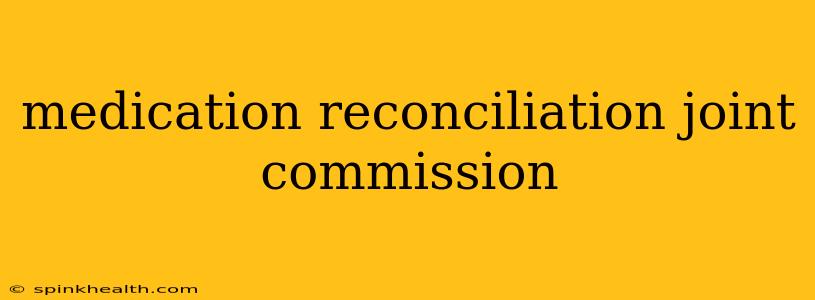The bustling hospital hallway hummed with activity. Dr. Ramirez, a seasoned physician, hurried towards his next patient, a 72-year-old woman named Mrs. Gable, admitted for a hip replacement. He knew the stakes were high; even a seemingly minor medication discrepancy could have serious consequences. This wasn't just about following protocol; it was about saving lives. This is the world of medication reconciliation, a critical process mandated by The Joint Commission (TJC) to ensure patient safety. Let's delve into why it's so important and how it's done.
What is Medication Reconciliation According to the Joint Commission?
The Joint Commission defines medication reconciliation as the process of comparing a patient's medication orders to all of the medications the patient has been taking. This includes over-the-counter medications, supplements, and herbal remedies. The goal is to provide accurate and complete medication information at all points of care transitions – from admission to discharge, and between different healthcare settings. Failure to accurately reconcile medications can lead to adverse drug events, hospital readmissions, and even death.
Why is Medication Reconciliation Important?
Imagine this: Mrs. Gable takes a blood thinner daily. If that information isn't accurately recorded and communicated throughout her hospital stay, a physician might prescribe another medication that interacts dangerously with the blood thinner, potentially leading to severe bleeding. That's the frightening reality of medication discrepancies. Medication reconciliation is critical because it:
- Reduces medication errors: By creating a complete and accurate medication list, the risk of prescribing duplicate medications, omitting necessary medications, or prescribing medications that interact negatively is significantly reduced.
- Improves patient safety: Preventing adverse drug events is the ultimate goal. Accurate reconciliation minimizes the chances of harmful interactions or incorrect dosages.
- Enhances patient communication: The process encourages open communication between patients, their families, and healthcare providers, fostering a collaborative approach to care.
- Decreases healthcare costs: Preventing medication errors leads to fewer hospital readmissions and complications, ultimately lowering healthcare costs.
How is Medication Reconciliation Done?
The process typically involves several steps:
- Collection of Medication Information: This involves gathering a complete list of all medications the patient is currently taking – prescription drugs, over-the-counter medications, herbal remedies, and supplements. This information comes from the patient, their family, their medication bottles, and previous medical records.
- Verification of Medication Information: The healthcare team verifies the accuracy of the collected information with the patient and other reliable sources. Discrepancies are flagged and addressed.
- Reconciliation of Medications: The medication list is compared with the physician's orders for the current episode of care. Any discrepancies are carefully reviewed and addressed by the physician or pharmacist.
- Documentation: All medication information, reconciliations, and any changes made are meticulously documented in the patient's medical record.
What are the Joint Commission Standards for Medication Reconciliation?
The Joint Commission sets clear standards for medication reconciliation, emphasizing the importance of:
- Comprehensive medication lists: These lists must include all medications, including those not prescribed by a physician.
- Timely reconciliation: The process should occur at specific transition points of care (admission, transfer, discharge).
- Accurate documentation: All reconciliation activities should be thoroughly documented.
- Communication: Effective communication between healthcare providers is crucial.
- Patient involvement: Patients and their caregivers should actively participate in the process.
How Does Medication Reconciliation Affect Patients?
Improved Patient Outcomes: Accurate medication reconciliation directly leads to better patient outcomes. Fewer adverse drug events mean fewer hospital readmissions, reduced complications, and improved overall health.
What are the consequences of not performing medication reconciliation?
Failure to conduct proper medication reconciliation puts patients at serious risk for adverse drug events, potentially leading to prolonged hospital stays, increased healthcare costs, and even death. The Joint Commission's emphasis on this process underscores its vital role in ensuring patient safety and the quality of care.
Dr. Ramirez carefully reviewed Mrs. Gable's medication list, ensuring complete accuracy before proceeding with her treatment. This wasn't just a checklist; it was a commitment to her safety, a reflection of the Joint Commission's crucial emphasis on medication reconciliation, a commitment shared by all healthcare providers dedicated to patient well-being. Medication reconciliation: a seemingly simple process, but one that makes a profound difference in ensuring positive patient outcomes.

